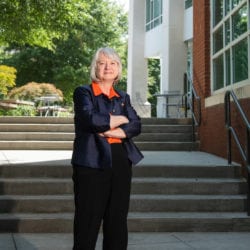
Amy Apon, PhD
Clemson University
Professor and C. Tycho Howle Director of the School of Computing
Expertise:
Cloud ComputingCyberinfrastructureSupercomputers
With a distinguished background in computer science, Apon’s research includes exploring the performance, improvement and evaluation of parallel and distributed systems, and utilizing various cloud-computing architectures in order to solve important scientific and industry-related problems. Her research around the commercial cloud is making computational systems accessible to all kinds of industries and business sizes. In collaboration, her work has been recognized by commercial cloud companies for building systems that take streaming data and, after analyzing the data, working with the size of the data to address latency issues and design or build cloud architecture to meet the requirements or provide a solution. An example of this would be connected transportation systems in traffic planning for commercial and passenger vehicles discussed in “Data Analytics for Intelligent Transportation Systems,” a book co-authored with colleagues. Before coming to Clemson, and now with the Palmetto Cluster located on the main campus, she has studied supercomputers and all layers of cluster computing – from the application layer and network protocol layer to file systems, storage and more. Under her leadership, Clemson’s School of Computing has more robust research capabilities and is acquiring more recognition, ranking as one of the top 100 computer science schools in the United States, according to U.S. News & World Report, and the best in South Carolina, according to Niche.com. As an internationally recognized expert and thought leader in her field, Apon has won numerous awards, published more than 100 scholarly publications, and has served on over 50 boards and committees in various roles such as chair, reviewer and panelist. She has been a program officer in the Computer and Network Systems Division of the Computer and Information Science and Engineering (CISE) Directorate of the National Science Foundation and has served as the elected chair of the Coalition for Academic Scientific Computation (CASC). CASC regularly testifies before Congress and provides advice at the highest level of funding agencies on strategy and policy for scientific computation. Before joining Clemson, she was a professor at the University of Arkansas and started the Arkansas High Performance Computing Center, serving as its founding director. She also led cyberinfrastructure for the state of Arkansas. She’s taught at Vanderbilt University, Fisk University and East Central University, and she was a software design engineer for Texas Instruments.
No Pitches / Articles Found
"We use the cloud in our daily lives in ways we don't even realize. When you Google something on a map and you get navigation information so you can drive to a place you've never been before, there's a cloud architect in the background that is solving that problem for you.”
“We have a lot of resources here that not every institution has. In my particular area we have the Palmetto supercomputer, and the students have access to that. Then we have great faculty that are very dedicated to teaching students at all levels –from freshman all the way up to advanced graduate students. And I think we’re sort of the right size too. We’re big enough to be very diverse in intellectual pursuits but small enough that we can still know who our students are.”
“There are a lot of trade-offs between a big system that is expensive but allows your applications to run fast versus a small system that doesn’t cost as much but you have to wait a lot longer. Well, time is money, and some applications won't run at all unless the system is big enough. Studying those kinds of trade-offs is what I do in my research.”
“Making applications run efficiently and in a cost-effective way is like a rising tide raising all boats. You get a lot more computational power to solve real-world problems, if you can do it in a performance and cost-efficient way. A good example of an application that benefits is when people these days study the spread of a coronavirus, they’re using supercomputers to help analyze all the different factors around why it might spread to one place or another."